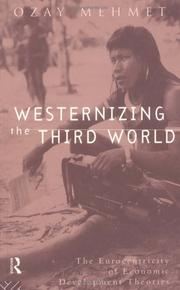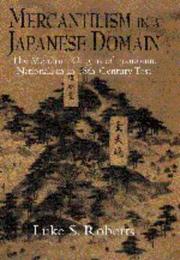| Listing 1 - 10 of 12 | << page >> |
Sort by
|
Book
ISBN: 1783088222 1783088214 1783088206 9781783088225 9781783088218 Year: 2018 Publisher: London : Anthem Press,
Abstract | Keywords | Export | Availability | Bookmark
 Loading...
Loading...Choose an application
- Reference Manager
- EndNote
- RefWorks (Direct export to RefWorks)
Austria Supreme, if It So Wishes (1684) provides a scholarly introduction to the Austrian-German mercantilist classic Oesterreich über Alles Wann es Nur Will (1684) by Philipp Wilhelm von Hörnigk.
Mercantile system --- Cameralism --- Kameralism --- Mercantilism (Mercantile system) --- Balance of trade --- Economic policy --- History --- Hörnigk, Philipp Wilhelm von, --- Austria --- Economic conditions
Book
ISBN: 9781783272280 1783272287 9781787440777 178744077X Year: 2017 Publisher: Suffolk Boydell & Brewer
Abstract | Keywords | Export | Availability | Bookmark
 Loading...
Loading...Choose an application
- Reference Manager
- EndNote
- RefWorks (Direct export to RefWorks)
This book discusses the impact of cameralism on the practices of governance, early modern state-building and economy in seventeenth- and eighteenth-century Europe. It argues that the cameralist conception of state and economy - a form of 'science' of government dedicated to reforming society while promoting economic development, and often associated mainly with Prussia - had significant impact far beyond Germany and Austria. In fact, its influence spread into Denmark, Sweden, Russia, Portugal, Northern Italy and other parts of Europe. In this volume, an international set of experts discusses administrative practices and policies in relation to population, forestry, proto-industry, trade, mining affairs, education, police regulation, and insurance. The book will appeal to early modernists, economic historians and historians of economic thought. MARTEN SEPPEL is Associate Professor of Early Modern History at the University of Tartu, Estonia. He holds an MPhil from the University of Cambridge. KEITH TRIBE has a PhD from the University of Cambridge and taught at the University of Keele (UK) from 1976 to 2002, retiring as Reader in Economics. He is now working as a highly regarded professional translator and independent scholar. Forthcoming work includes a new translation of Max Weber, Economy and Society Part One (Harvard University Press, 2018). His publications include Strategies of Economic Order (CUP, 1995/2007); The Economy of the Word. Language, History, and Economics (OUP, 2015); and (edited with Pat Hudson) The Contradictions of Capital in the Twenty-First Century (Agenda, 2016). Contributors: ROGER BARTLETT, ALEXANDRE MENDES CUNHA, HANS FRAMBACH, GUILLAUME GARNER, LARS MAGNUSSON, INGRID MARKUSSEN, FRANK OBERHOLZNER, GÖRAN RYDÉN, MARTEN SEPPEL, KEITH TRIBE, PAUL WARDE
Kameralistik. --- Mercantile system --- Mercantile system. --- Merkantilismus. --- Wirtschaft. --- History --- 1600-1799. --- Europa. --- Europe. --- Mercantilisme --- Cameralism --- Kameralism --- Mercantilism (Mercantile system) --- Balance of trade --- Economic policy --- capitalism. --- democray. --- economic development. --- economics. --- eighteenth century. --- european history. --- globalizations. --- government. --- industry. --- modernism. --- political science. --- seventeenth century.

ISBN: 0415118298 041511828X Year: 1995 Publisher: London Routledge
Abstract | Keywords | Export | Availability | Bookmark
 Loading...
Loading...Choose an application
- Reference Manager
- EndNote
- RefWorks (Direct export to RefWorks)
Économie sociale et solidaire --- Ethnocentrism. --- Mercantile system. --- Economic development --- Ethnocentrism --- Mercantile system --- 202 --- 338.340 --- AA / International- internationaal --- Cameralism --- Kameralism --- Mercantilism (Mercantile system) --- Balance of trade --- Economic policy --- Cultural relativism --- Ethnopsychology --- Nationalism --- Prejudices --- Race --- Development, Economic --- Economic growth --- Growth, Economic --- Economics --- Statics and dynamics (Social sciences) --- Development economics --- Resource curse --- Sociale organisatie --- Algemene ontwikkeling in de Derde Wereld --- Economic schools --- Third World: economic development problems --- Economic development. --- Aide économique --- Économie sociale et solidaire. --- Developing countries: economic development problems
Book
ISBN: 0520385225 0520385217 9780520385221 9780520385214 Year: 2022 Publisher: University of California Press
Abstract | Keywords | Export | Availability | Bookmark
 Loading...
Loading...Choose an application
- Reference Manager
- EndNote
- RefWorks (Direct export to RefWorks)
"Huizhou studies the construction of local identity through kinship in Huizhou prefecture, the most prominent merchant stronghold of Ming China. Making use of an array of untapped genealogies and other sources, Qitao Guo explores how developments in the sociocultural, religious, and gender realms in the fifteenth to sixteenth centuries intertwined to shape Huizhou identity as a land of "prominent lineages." This gentrified self-image both sheltered and guided the development of mercantile lineages, which were further bolstered by the gender regime and the local religious order. As Guo demonstrates, the discrepancy between representation and practice helps explain Huizhou's triumphs. The more active the economy became, the more those central to its commercialization embraced conservative sociocultural norms. Home lineages embraced neo-Confucian orthodoxy even as they provided the financial and logistical support to assure the success of Huizhou merchants. The end result was not "capitalism" but gentrified mercantile lineage culture with Chinese-or Huizhou-characteristics"-- Provided by publisher.
Kinship --- Mercantile system --- Merchants --- HISTORY / Asia / China. --- History. --- Businesspeople --- Commerce --- Cameralism --- Kameralism --- Mercantilism (Mercantile system) --- Balance of trade --- Economic policy --- Ethnology --- Clans --- Consanguinity --- Families --- Kin recognition --- She Xian (Anhui Sheng, China) --- China --- Social conditions --- History --- She-hsien (Anhui Sheng, China) --- Shexian (Anhui Sheng, China) --- Hsi-hsien (Anhui Sheng, China) --- Sihsien (Anhui Sheng, China) --- Sisen (Anhui Sheng, China) --- She-hsien, China --- Huizhou Fu (Anhui Sheng, China) --- Mercantile system.

ISBN: 3506991620 3825203980 Year: 1977 Volume: 398 Publisher: Paderborn : Ferdinand Schöningh,
Abstract | Keywords | Export | Availability | Bookmark
 Loading...
Loading...Choose an application
- Reference Manager
- EndNote
- RefWorks (Direct export to RefWorks)
Cities and towns --- Feudalism --- Mercantile system --- Villes --- Féodalité --- Mercantilisme --- History --- Histoire --- Germany --- Allemagne --- Economic conditions --- Social conditions --- Conditions économiques --- Conditions sociales --- 338 <09> <43> --- Economische geschiedenis--Duitsland voor 1945 en na 1989 --- 338 <09> <43> Economische geschiedenis--Duitsland voor 1945 en na 1989 --- -Mercantile system --- Cameralism --- Kameralism --- Mercantilism (Mercantile system) --- Balance of trade --- Economic policy --- Global cities --- Municipalities --- Towns --- Urban areas --- Urban systems --- Human settlements --- Sociology, Urban --- Economic conditions. --- Social conditions. --- 943 --- 943 Geschiedenis van Duitsland --- Geschiedenis van Duitsland --- 943 History of Germany --- History of Germany --- Proto-industrialisation --- Conditions economiques --- 9e-19e siecles
Book
ISBN: 1852789891 Year: 1996 Volume: 1 Publisher: Cheltenham : Edward Elgar,
Abstract | Keywords | Export | Availability | Bookmark
 Loading...
Loading...Choose an application
- Reference Manager
- EndNote
- RefWorks (Direct export to RefWorks)
Commerce --- Economic history --- International trade --- Mercantile system --- Trading companies --- Histoire économique --- Commerce international --- Mercantilisme --- Sociétés de commerce --- History --- Histoire --- 338 <09> --- 339 <09> --- -International trade --- -Mercantile system --- -Trading companies --- -Export-import companies --- Foreign trade enterprises --- Import-export companies --- Business enterprises --- Foreign trade promotion --- External trade --- Foreign commerce --- Foreign trade --- Global commerce --- Global trade --- Trade, International --- World trade --- International economic relations --- Non-traded goods --- Trade --- Economics --- Business --- Transportation --- Cameralism --- Kameralism --- Mercantilism (Mercantile system) --- Balance of trade --- Economic policy --- Economische geschiedenis --- Handelsgeschiedenis --- Economic History --- Economic history. --- History. --- -Economische geschiedenis --- 339 <09> Handelsgeschiedenis --- 338 <09> Economische geschiedenis --- -Cameralism --- Export-import companies --- Histoire économique --- Sociétés de commerce --- Economic conditions --- History, Economic --- Compagnies commerciales --- Histoire economique
Book
ISBN: 9514108612 9789514108617 Year: 1999 Volume: 301 301 Publisher: Helsinki: Academia scientiarum Fennica,
Abstract | Keywords | Export | Availability | Bookmark
 Loading...
Loading...Choose an application
- Reference Manager
- EndNote
- RefWorks (Direct export to RefWorks)
Mercantile system --- History --- -Mercantile system --- -Cameralism --- Kameralism --- Mercantilism --- Balance of trade --- Economic policy --- -History --- -Davenant, Charles --- Sidney, Algernon --- Great Britain --- Commerce --- -Commerce --- -Commercial policy --- -Military policy. --- Politics and government --- -Politics and government --- Cameralism --- Mercantilism (Mercantile system) --- Davenant, Charles, --- Sidney, Algernon, --- Avenant, Charles D', --- Davenant, --- Double, Thomas, --- Double, --- Double, Tom, --- Author of the Essay on ways and means, --- Essay on ways and means, Author of the, --- Author of an Essay on the East India trade, --- Essay on the East India trade, Author of an, --- Author of the Essay of ways and means, --- Essay of ways and means, Author of the, --- Wayes and means, Author of, --- Author of Wayes and means, --- Commercial policy --- Military policy. --- Mercantile system - Great Britain - History - 18th century. --- Mercantile system - Great Britain - History - 17th century. --- Davenant (charles), 1656-1714 --- Pensee economique et sociale
Book
ISBN: 134957547X 1137553685 1137547898 Year: 2016 Publisher: New York : Palgrave Macmillan US : Imprint: Palgrave Macmillan,
Abstract | Keywords | Export | Availability | Bookmark
 Loading...
Loading...Choose an application
- Reference Manager
- EndNote
- RefWorks (Direct export to RefWorks)
In The Financial Crisis Reconsidered, Aronoff challenges the conventional view that reckless credit produced the US housing boom and the financial crisis, explaining how the large current account deficit, and its mercantilist origin, was a more fundamental cause. He also demonstrates that the decision to provide relief for bank creditors rather than underwater homeowners was responsible for the prolonged recession that followed the crisis. Aronoff proposes a novel theory to account for the ultimate origins of secular stagnation and economic volatility. He shows how accumulation, which occurs when a person or country earns more than it ever plans to spend, generates both an excess of saving and a deficiency in demand. While savings provide the funds to promote booms, under-consumption ensures that these booms will turn bust and that the economy will fall short of its potential growth rate. Aronoff argues that mercantilists and top income earners engage in accumulation, and that the influence of both types has grown in recent decades. Combining economic theory and historical narrative, this book offers a new perspective of the housing boom and the financial crisis, concluding with innovative policy proposals to reduce accumulation without compromising the benefits of a market economy.
Global Financial Crisis, 2008-2009 --- Financial crises --- Business cycles --- Mercantile system --- Economic Theory --- Business & Economics --- Global Financial Crisis, 2008-2009. --- Financial crises. --- Business cycles. --- Mercantile system. --- Cameralism --- Kameralism --- Mercantilism (Mercantile system) --- Economic cycles --- Economic fluctuations --- Crashes, Financial --- Crises, Financial --- Financial crashes --- Financial panics --- Panics (Finance) --- Stock exchange crashes --- Stock market panics --- Global Economic Crisis, 2008-2009 --- Subprime Mortgage Crisis, 2008-2009 --- Balance of trade --- Economic policy --- Cycles --- Crises --- Capital market. --- Economic history. --- Macroeconomics. --- Finance --- Finance, Public. --- Public finance. --- Capital Markets. --- Economic History. --- Macroeconomics/Monetary Economics//Financial Economics. --- Financial History. --- Public Finance. --- Public Economics. --- History. --- Cameralistics --- Public finance --- Currency question --- Economics --- Economic conditions --- History, Economic --- Capital markets --- Market, Capital --- Financial institutions --- Loans --- Money market --- Securities --- Crowding out (Economics) --- Efficient market theory --- Public finances --- Finance—History.

ISBN: 0521621313 051157276X Year: 1998 Publisher: Cambridge : Cambridge University Press,
Abstract | Keywords | Export | Availability | Bookmark
 Loading...
Loading...Choose an application
- Reference Manager
- EndNote
- RefWorks (Direct export to RefWorks)
This book explores the historical roots of economic nationalism within Japan. By examining how mercantilist thought developed in the eighteenth-century domain of Tosa, the author shows how economic ideas were generated within the domains. During the Edo period (1600-1867), Japan was divided into over 230 realms, many of which developed into competitive states that struggled to reduce the dominance of the shogun's economy. The seventeenth-century Japanese economy was based on samurai notions of service and a rhetoric of political economy which centred on the lord and the samurai class. This 'economy of service', however, led to crises of deforestation and land degradation, government fiscal insolvency and increasingly corrupt tax levies, and finally a loss of faith in government. Commoners led the response with a mercantilist strategy of protection and development of the commercial economy. They resisted the economy of service by creating a new economic rhetoric which decentred the lord, imagined the domain as an economic country, and gave merchants a public worth and identity unknown in Confucian economic thought.
Mercantile system --- J3467 --- J4300.60 --- J4390.67 --- J4500 --- Cameralism --- Kameralism --- Mercantilism (Mercantile system) --- Balance of trade --- Economic policy --- History --- Japan: Geography and local history -- Shikoku -- Kōchi prefecture (Tosa) --- Japan: Economy and industry -- history -- Kinsei, Edo, Tokugawa period, early modern (1600-1867) --- Japan: Economy and industry -- local economic history and geography -- Shikoku -- Kōchi prefecture (Tosa) --- Japan: Economy and industry -- commerce and trade --- Japan --- Tosa-han (Japan) --- Do-shū-han (Japan) --- Tosa, Japan (Fief) --- Kōchi-han (Japan) --- al-Yābān --- Giappone --- Government of Japan --- Iapōnia --- I︠A︡ponii︠a︡ --- Japam --- Japani --- Japão --- Japon --- Japonia --- Japonsko --- Japonya --- Jih-pen --- Mư̄ang Yīpun --- Nihon --- Nihon-koku --- Nihonkoku --- Nippon --- Nippon-koku --- Nipponkoku --- Prathēt Yīpun --- Riben --- State of Japan --- Yābān --- Yapan --- Yīpun --- Zhāpān --- Япония --- اليابان --- يابان --- 日本 --- 日本国 --- Commercial policy --- Economic conditions. --- Arts and Humanities --- Jepun --- Yapon --- Yapon Ulus --- I︠A︡pon --- Япон --- I︠A︡pon Uls --- Япон Улс

ISBN: 2213600465 9782213600468 Year: 1998 Publisher: Paris: Fayard,
Abstract | Keywords | Export | Availability | Bookmark
 Loading...
Loading...Choose an application
- Reference Manager
- EndNote
- RefWorks (Direct export to RefWorks)
History of France --- anno 1700-1799 --- Industrial policy --- Economic policy --- Mercantile system --- Politique industrielle --- Politique économique --- Mercantilisme --- France --- Economic conditions --- Conditions économiques --- History --- Colbert, Jean Baptiste, --- Influence --- Commerce --- Territorial expansion --- histoire economique --- etat --- nijverheid --- france --- economische geschiedenis --- staat --- industrie --- frankrijk --- Enlightenment --- Politique économique --- Conditions économiques --- Cameralism --- Kameralism --- Mercantilism (Mercantile system) --- Balance of trade --- Colbert de Seignelay, Joannes Baptista, --- Colbert, J.-B. --- Colbert, --- Kolʹber, Zh.-B. --- Kolʹber, Zhan-Batist, --- Seignelay, Joannes Baptista Colbert de, --- Seignelay, --- Influence. --- Pʻŭrangsŭ --- Frankrig --- Francja --- Frant︠s︡ii︠a︡ --- Prantsusmaa --- Francia (Republic) --- Tsarfat --- Tsorfat --- Franḳraykh --- Frankreich --- Fa-kuo --- Faguo --- Франция --- French Republic --- République française --- Peurancih --- Frankryk --- Franse Republiek --- Francland --- Frencisc Cynewīse --- فرنسا --- Faransā --- Franza --- Republica Franzesa --- Gallia (Republic) --- Hyãsia --- Phransiya --- Fransa --- Fransa Respublikası --- Franse --- Францыя --- Frantsyi︠a︡ --- Французская Рэспубліка --- Frantsuzskai︠a︡ Rėspublika --- Parancis --- Pransya --- Franis --- Francuska --- Republika Francuska --- Bro-C'hall --- Френска република --- Frenska republika --- França --- República Francesa --- Pransiya --- Republikang Pranses --- Γαλλία --- Gallia --- Γαλλική Δημοκρατία --- Gallikē Dēmokratia --- فرانسه --- Farānsah --- צרפת --- רפובליקה הצרפתית --- Republiḳah ha-Tsarfatit --- פראנקרייך --- 法国 --- 法蘭西共和國 --- Falanxi Gongheguo --- フランス --- Furansu --- フランス共和国 --- Furansu Kyōwakoku --- Francija --- Ranska --- Frankrike --- France (Provisional government, 1944-1946) --- Territorial expansion. --- Colbert, Jean-Baptiste --- 18th century --- 프랑스 --- Falanxi --- Fa-lan-hsi --- 法蘭西 --- Frankrijk --- Frant︠s︡ --- Франц --- Frant︠s︡ Uls --- Франц Улс --- Mercantile system - France - History - 18th century --- Colbert, Jean Baptiste, - 1619-1683 - Influence --- France - Commerce - History - 18th century --- France - Territorial expansion --- France - Economic conditions - 18th century --- FRANCE --- MERCANTILISME --- HISTOIRE ECONOMIQUE --- 18E SIECLE --- INDUSTRIE ET ETAT --- Colbert, Jean Baptiste, - 1619-1683
| Listing 1 - 10 of 12 | << page >> |
Sort by
|

 Search
Search Feedback
Feedback About UniCat
About UniCat  Help
Help News
News